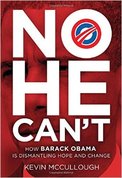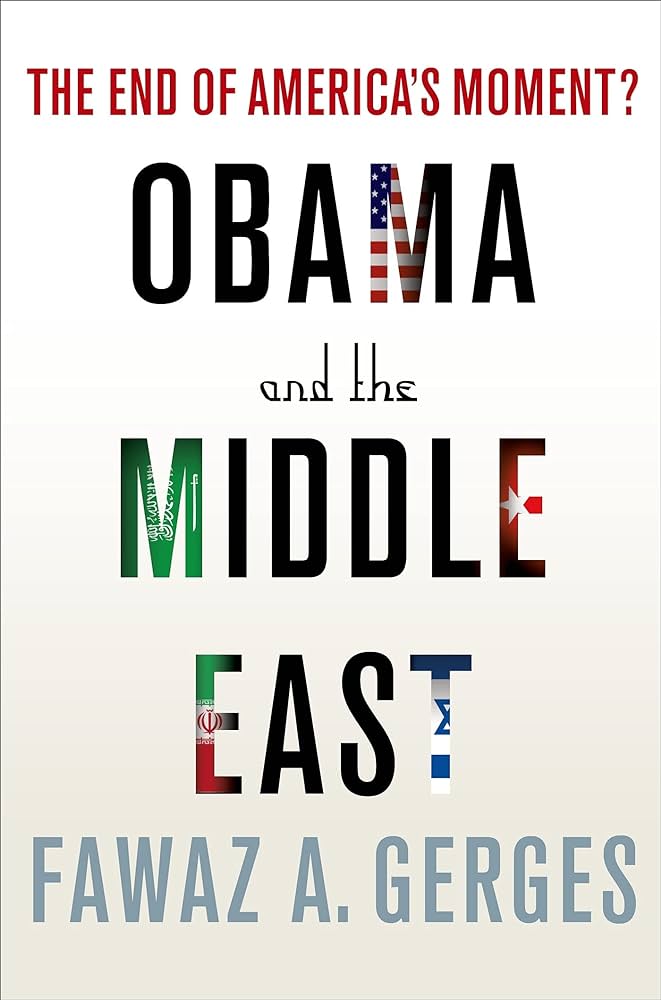 For many citizens, Obama’s election in 2008 was a threat to the “Hope and Change” America really needed. In his book No He Can’t: How Barack Obama is Dismantling Hope and Change, nationally syndicated talk show host Kevin McCullough accepts his fated responsibility to expose the imminent danger he believed Obama posed to his country. In the Introduction, McCullough notes that the path of his professional life may have been divinely entangled with the destined forty-fourth president. Their lives indirectly crossed paths in Chicago where McCullough was a theology and journalism student four years after Obama began his political career as a community organizer in 1985. McCullough recalls Obama’s “failed attempt for a higher office before finally settling into his place in the Illinois state legislature,” foreshadowing the rise of “one of the most dangerous politicians our generation will see” (p. xvii). Later, as a professional journalist following Obama’s race for a seat in the U.S. Senate—ending in a decisive victory over Alan Keyes—McCullough says he predicted and observed the constellation of five factors that would soon fast track an unexperienced, smooth talking junior senator to the Oval Office—the political throne of a world that was at the time in a state of turmoil. Seeing his prophecy come true—Obama receiving support from evangelicals, African Americans looking to make history, Republicans losing track of their conservative principles, John McCain's weak campaign, distracted moderates—McCullough was obligated to speak up and warn his fellow citizens.
He refused to keep biting his tongue, even though he accepted the possibility that divine providence might have allowed Obama to win the 2008 presidential election. He compiled a litany of critiques of Obama’s performance in the first year in office. They are distributed according to the four themes with which the book is concerned—the economy, national security, rights issues, and accountability. By McCullough’s criteria, including the Americans he speaks for, Obama was bad for the country. Obama “failed at nearly everything possible in office, except exporting our tax dollars to pay for abortions overseas . . .” (p. 44). He gave his president’s handling of the economy a grade D- and did not see any possibility for improvement by the end of Obama’s first term. My goal here is not to debate the particular accusations. Besides, conservatives and liberals interpret the same facts (i.e., whether Obamacare is good for the nation) differently. My liberal filter, indeed, found the majority of McCullough’s “facts” against Obama to be confused and misleading. But I admit that he presents legitimate concerns and hints of foul play on Obama’s part, whether they were intentional or unintentional. Here are two issues on which I am sympathetic to McCullough’s concerns. His critique of Obama’s lack of experience is valid. “One of the significant criticisms in my own mind as to Barack Obama’s weakness as a leader,” McCullough says, “was the fact that he had little-to-no executive experience outside of political campaigns” (p. 5). Edward Klein in his book The Amateur: Barack Obama in the White House (2012) feels the same way. Fair enough. This is not a concern for conservatives only. Every presidential candidate’s political track record should be a point of concern for every American citizen. Second, I appreciate McCullough for pointing out Obama’s gross mischaracterization of figures in a public comment regarding amputations. At a town hall meeting promoting Obamacare, Obama is on the record saying that doctors receive $30,000 to $50,000 for amputations that could be prevented with improved care for diabetes. McCullough notes that the American Medical Association (AMA) refuted the gross and insulting claim. The AMA said the cost is in the range of $500 to $700 (pp. 139–140). Yes, this appears to be a distortion of facts in order to appeal to people’s emotions. Liberals and progressives, evidently, cannot easily dismiss McCullough as a hater. On the other hand, his underlying argument is debatable. He believes that Obama and the liberal position do not represent authentic American values and that whatever they are, they are ungodly. Though he is disturbed by their perceived disloyalty to American exceptionalism, McCullough explains that “the primary difference between the Left and the Right is their view of God. To the Right, God is someone who is outside of humanity, uncontrollable by human effort beyond them, sovereign over them” (pp. 154–155). The inference is that Republican principles are morally superior because they are founded on their understanding of God’s final word about what is right and what is wrong. He paints democrats, liberals and progressives as de facto atheists, or perhaps morally challenged souls at best. He writes, “to the Left, God is someone who might exist. Or if he does, he is relatively uninvolved or uninterested and certainly unauthoritative in today’s world” (p. 155). Sure, humanists and atheists tend to cast their lot with liberal policies. But countless God fearing and Jesus loving men and women do as well. In fact, the collection of homilies and essays edited by Marvin A. McMickle in The Audacity of Faith: Christian Leaders Reflect on the Election of Barack Obama (2009) attests to the wide range of Christian responses to Obama’s liberal position, some of which are critical, skeptical, or sympathetic. The real target behind McCullough’s anti-Obama tirade is the secular society—a society that does not rely on religion, particularly evangelical Christianity, to establish a moral and just society. As far as McCullough sees, the logical and guaranteed outcome of the American leftist agenda is a morally bankrupt society run by a big government, bereft of Jesus Christ’s blessings. He is not alone in this opinion, as I will show in the upcoming reviews. As patriotic as it may be for any American citizen to boldly stand up for his brand of American beliefs, he is still accountable for making clear what exactly he’s standing for and against. There is no doubt that McCullough supports conservative Christian values. Needless to say, he abhors liberal values. He treats these values as if they are inherently un-American and sinful. And because Obama endorses the liberal position, it is unsurprising that McCullough detests Obama’s political endeavors. But it is less certain what he thinks about Obama. I cannot tell what kind of person McCullough thinks Obama is, though he admits that the president is not “evil personified” (p. xvii). Is he a quixotic optimist who “from the day he took office, seemed to believe in a Utopia that he still sees in his mind today . . . where hunger, homelessness, heartache, and heart burn do not exist” (p. 27)? Or, should we believe that Obama is a malicious power monger who “would get elected by standing on the shoulders of the poor, and then do all he could to keep them there” (p. 30)? Can Obama be both? Also, I might add that McCullough frequently uses the phrase “We the People” in a way that suggest all Americans share his views. He says, “’We the People’ gave him the benefit of the doubt” just to be betrayed within eight months (p. 129). Later he says, “because of this ’We the People’ feel very much like the wife who has been cheated on and even abused by neglect, dishonesty, and trickery” (P. 145). However, Jonathan Alter in his book The Center Holds: Obama and His Enemies tells a story in which some Americans believed Obama was the victim in the relationship with America, and decided to elect him again in 2012. Such lack of clarity is unacceptable by McCullough’s own standards. Every chapter in his book ends with a section called “Time For A Bit of Clarity,” ensuring that his points are well understood. Moreover, he concludes that “liberals don’t know things—like the definition of ‘is’—objectively, but rather, only what they are told, what they choose to believe, and what they intended for things to mean” (p. 126). In other words, liberals are not able to clearly define things, not to mention recognize good from evil. Obama ultimately “is misguided at best, or a deceptive traitor at worst,” according to McCullough (p. 81). Perhaps, he did not have enough time to figure out who Obama is or does not care to find out, because “neither option brings us much consolation” (p. 81). In his favor, it is worth acknowledging that he could have easily committed to the frightening characterizations put forth by Obama’s other critics, such as Aaron Klein and Brenda J. Elliott in the The Manchurian President: Barack Obama’s ties to Communists, Socialists and Other Anti-American Extremists (2010). Nonetheless, the ambiguity of McCullough’s fundamental understanding of Obama the person, including his use of “We the People” when he means Americans who share his views, undermine the credibility of his claim to know what the subtitle of his book assures us: “How Barack Obama is Dismantling Hope and Change.” But if we read No He Can’t as a contemporary psalm that bewails the perceived threat of what Obama’s politics represent—the decline in the social significance and political influence of conservative Christian values in the United States—the book makes sense and illuminates McCullough’s dissatisfaction with Obama, regardless of how poorly he knows the man.
0 Comments
Leave a Reply. |
Kasaun E. HenryKasaun is a philosopher and intellectual historian, from Harlem, NY. He specializes in the intellectual history of American democracy and the American Dream, theories of secularization, and the history and philosophy of human rights. He also focuses on the "Obama Phenomenon" and "The Age of Obama." ArchivesCategoriesUpcoming review . . .
|
 RSS Feed
RSS Feed

